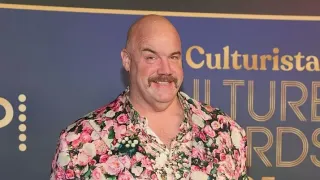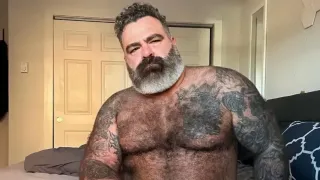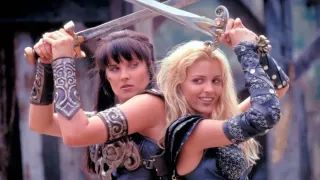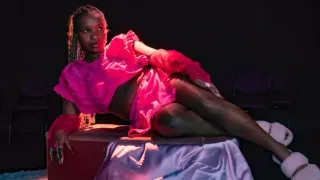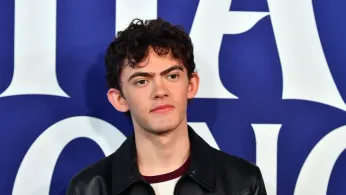
6 hours ago
Joe Locke Opens Up About Imposter Syndrome On Elizabeth Day Podcast
READ TIME: 4 MIN.
Joe Locke, the 21-year-old actor who shot to stardom as Charlie Spring in Netflix’s breakthrough LGBTQ+ series "Heartstopper", has publicly addressed the emotional toll of rapid success and the persistent feeling of imposter syndrome that has followed his career trajectory. In a revealing appearance on the podcast "How to Fail with Elizabeth Day", Locke spoke openly about his internal doubts, the pressures of representation, and the ways fame has reshaped his youth—offering a rare and deeply personal perspective on the intersection of identity and stardom for young LGBTQ+ public figures .
Locke’s portrayal of Charlie Spring—a sensitive, openly gay schoolboy navigating first love—became an instant touchstone for young queer audiences worldwide. The series, adapted from Alice Oseman’s graphic novels, was widely praised for its nuanced depiction of LGBTQ+ relationships and its positive impact on representation in mainstream media . Locke’s own journey mirrored the show’s themes of self-discovery and acceptance, but as he revealed, the sudden visibility came with complex personal challenges.
Locke’s growing résumé now includes starring roles in Disney+/Marvel’s "Agatha All Along", a Broadway debut in "Sweeney Todd: The Demon Barber of Fleet Street", and preparation for his West End debut in "Clarkston" . Despite these achievements, Locke admitted that feelings of inadequacy and disbelief have continued to shape his outlook.
Imposter syndrome, a psychological pattern in which an individual doubts their accomplishments and fears being exposed as a "fraud," is common among high-achievers—especially those in creative and public-facing fields. For Locke, these feelings intensified in the wake of Heartstopper’s success.
“I feel like an imposter in my career because I was not handed the job, I was just very lucky,” Locke explained. “And I was very lucky that Heartstopper chose me and then I got a great agent and then I was lucky that other things fell into place. For a long time I felt like I didn’t necessarily belong in the job that I’m in. And so therefore I didn’t really have a belief that I could make a career out of it. I think there’s quite a lot of the times that I still find myself just feeling so grateful to be in the spaces I’m in that I forget that like, ‘Oh no, I’ve actually worked quite hard to be here’” .
Locke’s reflections resonate with many young LGBTQ+ professionals, who often grapple with visibility, representation, and expectations—both self-imposed and external. Fellow Heartstopper star Kit Connor has also spoken publicly about the pressures of fame and the anxiety that can accompany high-profile roles, highlighting the pervasive nature of imposter syndrome in the entertainment industry .
Beyond internal doubts, Locke’s rapid ascent has changed the pace and shape of his personal life. Originating from the Isle of Man, Locke found himself thrust into adult environments and responsibilities far earlier than many of his peers.
“I realised last year that I was living the life of someone in their mid-thirties and I was 20. I would go and visit my friends at their unis, and I’d feel so out of place,” Locke shared, recounting how his work commitments have often come at the expense of typical youthful experiences. He admitted to having “resented” aspects of his job for depriving him of “young people things,” such as spontaneous travel and romantic adventures with friends. Yet, Locke ultimately embraced his unique journey, stating, “I just need to enjoy the youth through that, the parts of it I can” .
His comments offer a window into the realities faced by young LGBTQ+ actors, who must balance career demands with the pressures of public scrutiny and the desire for normalcy.
Locke’s experience is emblematic of the broader challenges faced by LGBTQ+ individuals in media. As one of the most visible young gay actors working today, Locke is frequently lauded as a role model. However, this visibility also carries the weight of expectation, both from fans and the industry.
Kit Connor, Locke’s co-star, similarly described the complex responsibility of setting a positive example. “The show that we’re doing is really setting blueprints for people to know how to treat these delicate situations, and how to make people feel safe and comfortable,” Connor said, emphasizing the importance of authenticity in storytelling and representation .
Locke has spoken candidly about his sexuality, sharing that he has been openly gay since age 12, but also noting, “People have assumed and written it, and I haven’t ever corrected anyone because I haven’t felt the need to. But I’ve never specifically stated my sexuality” . This balance of privacy and openness is a recurring theme among LGBTQ+ public figures, who often must navigate personal boundaries alongside public expectations.
Filming for "Heartstopper Forever", which will conclude the series’ storyline, wrapped in July 2025. Locke marked the occasion with a heartfelt behind-the-scenes photo alongside Kit Connor, captioned “Bye Charlie x thank you<3.” The upcoming film is expected to follow Charlie and Nick as they navigate a long-distance relationship, with Nick departing for university. Scheduled for release in 2026, the film promises to continue the franchise’s legacy of authentic LGBTQ+ storytelling .
Locke’s candidness about imposter syndrome and personal growth serves as a reminder of the importance of affirming, inclusive narratives within and beyond the entertainment industry. His journey highlights the ongoing need for mental health support, self-acceptance, and community—especially for young LGBTQ+ people who may see aspects of themselves reflected in his story.
As Locke continues to expand his career on stage and screen, his willingness to confront vulnerability publicly offers hope and solidarity to fans navigating their own paths. The impact of Heartstopper and its cast extends beyond television, setting new standards for queer representation and reminding audiences of the humanity behind every headline.

